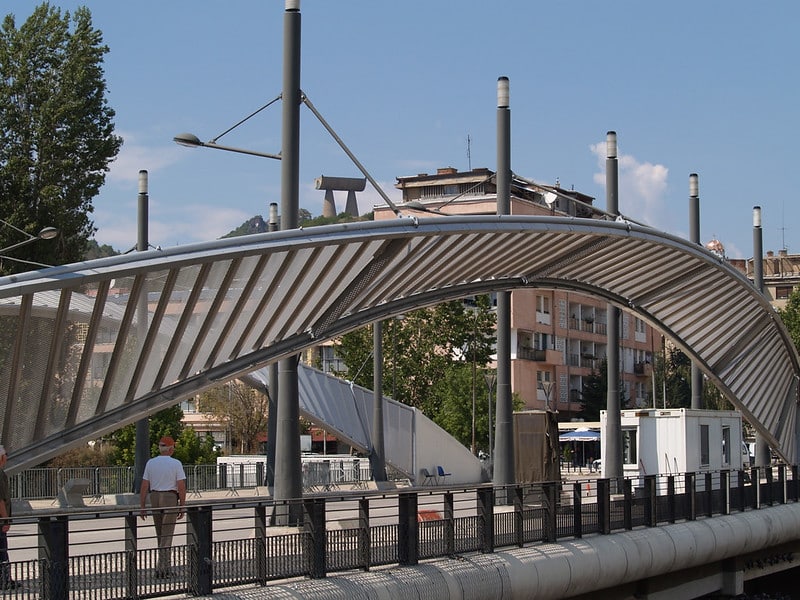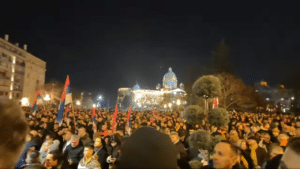Mitrovica bridge, separating Kosovar and Serb communities in town of Mitrovica, 2005 (Flickr)
Serb officials in Kosovo have collectively withdrawn from public institutions, only deepening divisions between Kosovars and Serbs in the. Meanwhile, Pristina and Belgrade continue to bicker over unfulfilled promises and progress is slow towards normalisation between the two governments.
Collective resignation as the next step in escalation
According to the Serbs, EU-mediated agreements are being violated by Kosovo. Serbian judges and mayors resigned their posts out of dissatisfaction with Kosovo’s implementation of promises. At the same time, Serbian police officers took off their uniforms on live television. The only Serbian minister in the Kosovo cabinet, Goran Rakić (Serb List), who had been minister of Communities and Return since 22 March 2021, has also resigned from his post. The resignations followed after Rakić’s party organised a meeting in the town of Zvecan in the north of Kosovo.
The functioning of local authorities is compromised by the action. Moreover, Kosovo must now avoid a constitutional problem at short notice to replace the 10 Serbian List MPs with others from the Serbian community. In Kosovo, Belgrade in particular was identified as the instigator of the mass resignation. Blerim Vela, Kosovo President Vjosa Osmani’s chief of cabinet, stressed that: “Serbia unilaterally violated all Brussels agreements on disbandment of its illegal structures in Kosovo”. Authorities in Kosovo have long complained that the government of Serbian President Vučić exercises undue influence in the country.
North Kosovo is mainly inhabited by ethnic Serbs, who form the majority in this part of the country. These residents mainly listen to the government in Belgrade, which therefore have de facto more authority in the northern region than its counterpart in Pristina. Protests against the government in Kosovo and expressions of support for Serbia take place here with some regularity. A day after the resignations on Saturday 5 November, protests in the region were attended by thousands of Serbs who waved Serbian and Russian flags.
Kosovo-Serbia relations increasingly strained ahead of escalation
Recently, this has not been the first time Kosovo and Serbia have been at loggerheads. A long-running issue around making Kosovan number plates compulsory is one example. The implementation period for this measure was recently extended, with refusers eventually liable to a fine – a Kosovo measure that caused great discontent among the Serb minority. At the same time, Serbia has already taken similar measures. Ultimately, an EU-facilitated dialogue was needed to halt tensions. Some parts of the measures were reversed by Pristina, but number plates remain an issue Kosovo refuses to deviate from.
Kosovo and Serbia invariably continue to point the finger at each other. Repressive measures from both countries ensure that it is mainly the population that is marginalised. Serbs in Kosovo remain furious over the ban on Serbia-issued number plates. Its delayed introduction has done little to change this. The fact that Kurti ordered local police to issue warnings here has led them to cease work. According to Serbian political leaders, the officials will not resume work until Kosovo changes its policy. Meanwhile, Kosovo accuses the Belgrade government of inciting people to go against the government in Pristina. That the police refuse to implement Kurti’s policy is a clear sign that this strategy does have an effect. Kosovo’s control in the north is increasingly crumbling and polarisation seems to be increasing.
The latest developments are highly detrimental to the European perspective of both countries. Both Serbia and Kosovo aspire to EU membership, but one of the core conditions for this is that the relationship between the two countries be greatly improved within a proposed framework of normalisation. However, improvement seems far away, deterioration ever closer. When Josep Borrell, the EU’s chief of foreign affairs, proudly announced in August that the EU had been instrumental in facilitating a dialogue to resolve the ethnic dispute over the cross-border movement of citizens, progression in mutual relations was the EU’s commitment. However, just over 2 months later, there is little sign of progress.
Little commitment to resolution
The concerns are great and the solution complicated. There is little willingness between the two sides to gravitate towards each other. Ultimately, the problem goes beyond number plates. The main issue is how both countries can work within the same unions. It currently seems inconceivable that Serbia and Kosovo can function together within the EU. The Serbian position on Kosovo is clear and seems unwavering. An independent Kosovo does not exist for the Serbian government and is by definition non-negotiable.
At the same time, recognition of Kosovo seems to be the only way genuine normalisation can exist. As long as the two countries do not respect each other’s citizens, the room for manoeuvre to reach a stable situation is limited. The undesirable status quo currently prevailing in Kosovo is not only questionable, but also seems to be increasingly tangible with the latest anti-Kosovo protests.
Author: Mathieu Neelen
Sources: BalkanInsight1, BalkanInsight2, Euronews, Trouw
Photo: Flickr



